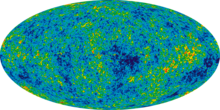This is not an encyclopedia article. If you find this page on any site other than Wikipedia, you are viewing a mirror site. Be aware that the page may be outdated and that the user to whom this page belongs may have no personal affiliation with any site other than Wikipedia itself. The original page is located at http://en.wikipedia.org/wiki/User:Paine_Ellsworth/on_Cosmology.
| Part of a series on |
| Physical cosmology |
|---|
 |

on Cosmology
(from the ancient Greek κόσμος, kosmos "world" and -λογία, -logia "study of")
Cosmology is the study of the origin, evolution, and eventual fate of the Universe. The scholarly and scientific study of the origin, large-scale structures and dynamics, plus the ultimate fate of the Universe, as well as the scientific laws that govern these realities, is called physical cosmology.[2]
Particle physics (also called "high energy physics") is the branch of science that studies the nature of the particles that constitute matter (particles with mass) and radiation (massless particles). Although the word "particle" can refer to various types of very small objects (e.g. protons, gas particles, or even household dust), "particle physics" usually investigates the irreducibly smallest detectable particles and the irreducibly fundamental force fields necessary to explain them.
This is a, sort of, "un-article", a non-article about a few of my own perceptions on the present state of the science of cosmology (2017) and about the Universe. I am Paine Ellsworth and I approved this message. (I've always wanted to put that in mainspace-article leads, but of course, that's a no-no. :>)
